








Kupu Arataki – Introduction... pg 3-8

› Quiz – The Summer Olympic Games... pg 7
Ā mātou korero – Our people
› International Nurses Day: Titiro whakamuri, Kokiri whakamua - Look back and reflect so you can move forward...pg 9
› Meet our nurses: Tapuhi Māori (Māori nurses) important for the future of healthcare in Aotearoa... pg 11
› Te Whatu Ora on display at Careers Expo... pg 13

› Two wheels to work – Waipapa’s newest bike park... pg 14
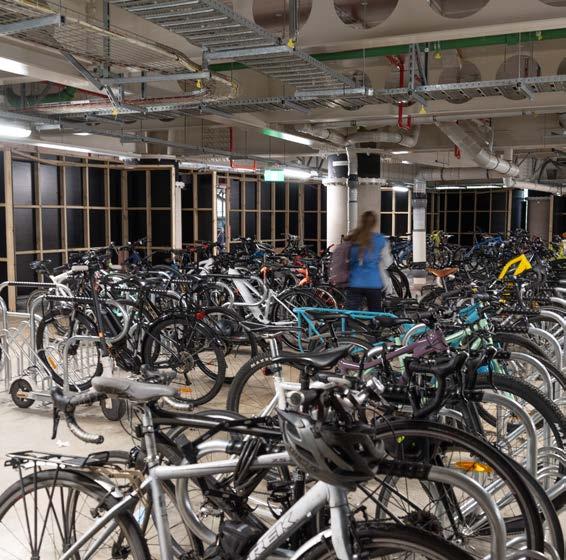
› One minute with Courtney Carter-Smith, Programme Lead and Smokefree Practitioner for Te Hā Waitaha, Smokefree Support based in Te Mana Ora, Community & Public Health Ōtautahi .... pg 15


› Akoranga reo Māori – lesson #15 He nui te tohutō - Macrons matter... pg 16
› International winter warmer recipes Pea and ham soup... pg 17
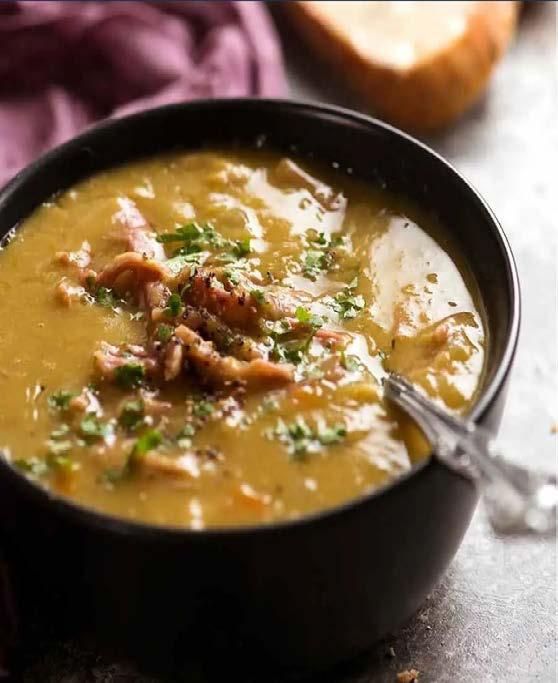
Whakamihi – Bouquets... pg 18-20
Ā mātou korero – Our stories
› Smokefree policy promotes healthier environment for patients and staff... pg 21
› University of Otago café welcomes all hospital kaimahi... pg 22
Pānui – Notices... pg 23–25
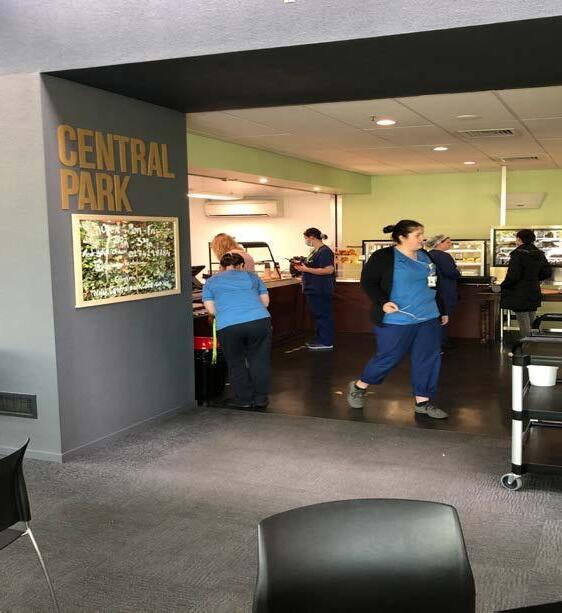

The government presented its latest Budget last Thursday and there are a few items that affect the health system. You can read the 2023 Wellbeing Budget at a glance here If you prefer more detail, you can read the full Budget documents here
Highlights relating to health include:
› Hauora funding of $130 million will continue to fund Māori Health providers including cheaper access to primary care, innovation funds for data, more rongoā (traditional Māori health) services, and provide workforce development
› Scrapping of the $5 prescription co-payments which will support 3 million New Zealanders to access cheaper medicines each year
› $864 million provided to ensure Whaikaha –Ministry of Disabled People can continue to deliver existing disability support services and develop and deliver future services for disabled people and tāngata
whaikaha Māori› Second year of a two-year funding package to support health system and reforms, with $1.3 billion per annum
› Specific investments include those agreed in 2022 of more than $1 billion to increase pay rates and boost staff numbers, and $20 million to lift COVID-19 immunisation and screening coverage for Māori and Pacific peoples
› Three multi-institution research hubs are being created ($400 million capital plus $51 million for operating costs) to improve scientific collaboration and meet complex challenges in New Zealand including health and wellbeing, climate change and advanced manufacturing and technology
› $38 million towards New Zealand joining the European Union’s Horizon Europe initiative, allowing researchers based in New Zealand to work closely with European researchers to solve global challenges, including climate change, energy and global health issues.
Representatives from Te Whatu Ora recently attended a careers expo at Christchurch Arena. Experts from Recruitment, Allied Health and Nursing impressed high school students and the public with props


Please continue to refer to the daily email and PRISM for the flu vaccination clinic nearest you.

The weather is becoming colder and we are seeing more people succumb to the flu. Not only is influenza extremely unpleasant and potentially dangerous, it has a huge impact on our ability to properly function as an organisation and provide healthcare to our community.
If you’re sick, you can make your whānau ill too and they in turn can spread it to their schools, workplaces and friends. When you’re unwell, you need to stay home and recover, and if we have multiple staff at home with illness, it affects our ability to provide much needed health services.

We want you to be protected so that even if you do contract the flu, you only experience mild symptoms and you’re less likely to spread it to the people you care about.
We need you to be protected and stay well so we can continue to provide much needed care to our community.
Your health is important, so if you haven’t already, please take advantage of the offer of a free flu vaccination.
The goal of Aotearoa Immunisation Week is for more children, adults, whānau and communities to be protected from vaccine-preventable diseases, allowing them to live happier, healthier lives.
It’s been more than three years since COVID-19 changed our lives and many New Zealanders, due to lockdowns and other priorities, have neglected to immunise themselves and/or their whānau. There is also a fair amount of vaccine fatigue in our community with people a little over the idea of having additional injections.
Immunisation is essential healthcare and something that we should all be up to date with. It not only protects you, but also your friends, whānau and community. We are all healthier when we are vaccinated.
To support this, there will be a series of locally-led events taking place across the motu, in addition to hundreds of immunisation opportunities at clinics, pharmacies and GP practices.
The Vaccination Programme produced a New Zealand Sign Language video about getting vaccinated. The video covers when to get a vaccine, which vaccines are free, how to book an appointment and a range of other general vaccine topics. This video was shared with the health sector during New Zealand Sign Language Week (8 to 12 May) and shared on Te Whatu Ora social channels. www.youtube.com/watch?v=X3Y5pCib_IY

A nationwide ‘Go well this winter’ campaign is launching to coincide with the beginning of winter next week. The colder temperatures, fewer daylight hours, and the coughs and sniffles we are starting to hear remind us that we are about to enter a challenging period for the health system. Winter will inevitably bring influenza, RSV and an increase in COVID-19 cases.
Prevention:
› Ensure your vaccinations are up-to-date, particularly flu and COVID-19. If you’re eligible for the bivalent COVID-19 booster, make sure you get it
› Maintain good hygiene: regularly wash or sanitise your hands, cough or sneeze into your elbow and keep shared surfaces (benchtops, desks) clean
› If you feel unwell or have any cold or flu symptoms (sore throat, cough, fever, aches, runny nose or congestion) stay home!
› If you’re unwell or have any symptoms, take a rapid antigen test (RAT) to check whether you have COVID-19. If you do, please ensure you follow the appropriate isolation guidelines
› Wear a mask. It may not be mandatory in most public spaces these days but anytime you’re in an enclosed or poorly ventilated space with other people, you’re at risk of catching or spreading airborne viruses.

Treatment:
› Self-care
» Prepare some essential supplies at home such as paracetamol, throat lozenges, RATs, tissues, masks and any other medications you think you might need over winter
» You can treat minor injuries and illnesses like colds, fevers and mild COVID-19 at home.
› Advice over the phone 24/7
» Call Healthline 0800 611 116 for free health advice anytime
» For unwell infants and children, call PlunketLine on 0800 933 922
» Call or text 1737 for mental health wellbeing.
› Pharmacy
» You can go to any pharmacy for advice and treatments for minor illnesses or injuries
» Your usual pharmacy can help you with your regular medications.

› General Practice
» For non-urgent illness and injuries, contact your usual general practice
» This includes, renewing your regular prescriptions, check-ups and medical certificates.
› Telehealth / virtual consultations
» If your usual general practice isn’t available to see you, you can book a virtual consultation with a clinician
» There are a number of apps and online tools available that allow you to consult with a health professional from the comfort of your own home
» For more information, go to: www. healthnavigator.org.nz/apps/v/virtual-consultapps/
› Urgent care (Christchurch)
» If your issue is urgent, you can attend one of three urgent care facilities in Christchurch or an afterhours general practice
» You can find more information here
› Emergency
» If it is a life-threatening emergency, do not hesitate, call 111.

How much do you know about the athletes, hosts and events at the Summer Olympic Games?
1. The first Olympic Games took place in the 8th century B.C. in Olympia, Greece and were held every four years for 12 centuries until the 4th century A.D. when all pagan festivals were banned by Emperor Theodosius I and the Olympics were no more. In what year were the first modern Olympics held?
a. 1892
b. 1896
c. 1900
d. 1904
2. What country has hosted the most modern summer Olympic Games?
a. USA
b. France
c. Australia
d. United Kingdom
3. What royal mother and daughter both represented their country at the summer Olympics?
a. Princess Margaret and her daughter Lady Sarah Chatto (UK)
b. Princess Caroline and her daughter Charlotte Casiraghi (Monaco)
c. Queen Sofia and her daughter Princess Cristina (Spain)
d. Princess Anne and her daughter Zara Tindall (UK)
4. True or false. For a period, the arts, including painting, sculpture, literature and music were all events at the summer Olympic Games.
a. True
b. False
5. Who is New Zealand’s most successful summer Olympian?
a. Mark Todd (Equestrian)
b. Valerie Adams (Shot put)
c. Lisa Carrington (Canoe/kayak)
d. Hamish Bond (Rowing)
6. What is the only city to have hosted both summer and winter Olympic Games?
a. Beijing
b. Seoul
c. Moscow
d. Montreal
7. Why did Afghanistan, Albania, Burma, El Salvador, Guyana, Iraq, Sri Lanka, Syria and Tanzania, lead a boycott of twenty-two African nations at the 1976 Montreal Summer Olympics?
a. Concerns about athlete safety after the massacre of Israeli athletes in Munich in 1972
b. In protest of the New Zealand All Blacks
touring South Africa that same year (due to the apartheid policies in place in South Africa at that time)
c. In protest of French nuclear testing
d. In protest of Canada failing to recognise Taiwan as an independent nation
8. What nickname did swimmer Eric Moussambani from Equatorial Guinea earn at the Sydney Olympics in 2000?
a. Eric the conqueror
b. Eric the exceptional
c. Eric the eel
d. Eric the duck
9. American swimmer Michael Phelps has won more Olympic medals than any other athlete. How many does he have in total?
a. 25

b. 28
c. 30
d. 33
10. In what way were the 2012 London Summer Olympics significant for women?
a. It was the first time that women competed in every sport
b. It was the first time that 50 percent of the athletes were women
c. It was the first time the International Olympic Committee had a female
president

d. It was the first time that every participating nation had at least one female athlete
competing
Check your answers on page 23.
Last Friday was Pink Shirt Day- a day when we stand up to shine a light on bullying while celebrating diversity and promoting kindness and inclusiveness.
The theme of this year’s Pink Shirt Day was ‘Everyday Upstander, see someone being bullied? Be an upstander, not a bystander. Call it out. Stand with them. Get help’.
It’s not always easy to stand up to bullying but it is important that we do what we can to call out this behaviour when we see it.

Many of our kaimahi (and their pets) marked the day by wearing pink. In the Corporate office, there was also a celebratory pink morning tea. Check out the group here sending a ‘Happy Pink Shirt Day’ message to all.



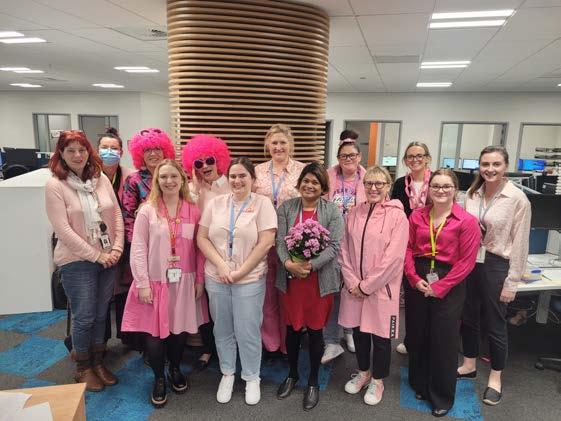
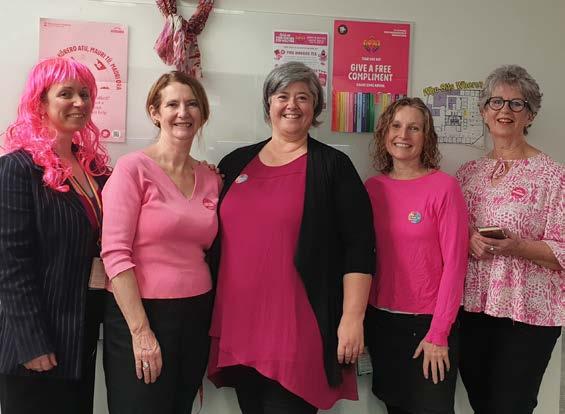
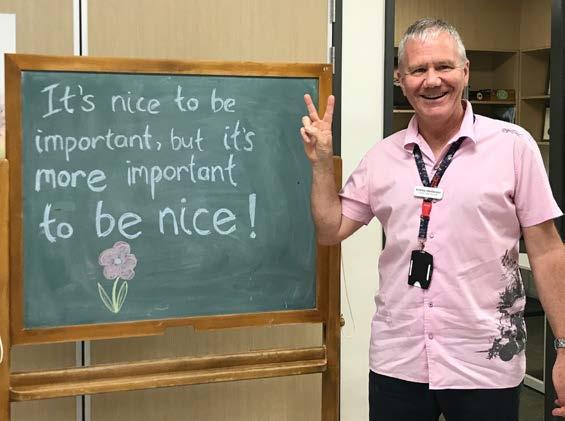

Article contributed by Nurse Coordinator Cathy King
On 12 May, we celebrated International Nurses Day which coincided with the 202nd anniversary of Florence Nightingale’s birth. The International Council of Nurses (ICN) theme ‘Our Nurses.
Our Future’, as indicated in the pānui on 8 May, advocates for “nursing in the future to address the global health challenges and improve global health for all”. Additionally, the ICN also emphasises the importance of “nurses moving from invisible to invaluable in the eyes of policy makers, the public and all those who make decisions affecting and financing of health care”. What does this mean for nursing in the future?
Within Aotearoa and globally, healthcare is undergoing significant changes in the current climate of workforce shortages, environmental concerns and economic downturn. Therefore, as an experienced nurse, I offer some thoughts on how nurses can improve global health for all.
Throughout recorded history, the care of the sick and infirm was carried out by family, monks, nuns, and untrained gaolers. This task was considered suitable for disreputable and lower-class women. However, Florence Nightingale, widely recognised as the pioneer of modern nursing, changed the public perception of this profession. Nursing was no longer frowned upon by the upper classes and was instead viewed as an honourable vocation.
Here in Aotearoa, our nursing history began in the 1800s. Early training of nurses in New Zealand was rather ad hoc, however during the 1880s, some hospitals began to offer training and accommodation onsite to attract ‘respectable’ women into nursing. As more women entered the profession, there was increased demand for improved conditions for both nurses and their patients.
Assistant Inspector in the Department of Asylums and Hospitals from 1895 to 1906, Grace Neill was a major advocate for professional nursing in New Zealand. In 1899, at a congress of the International Council of Women in London, Neill called for a
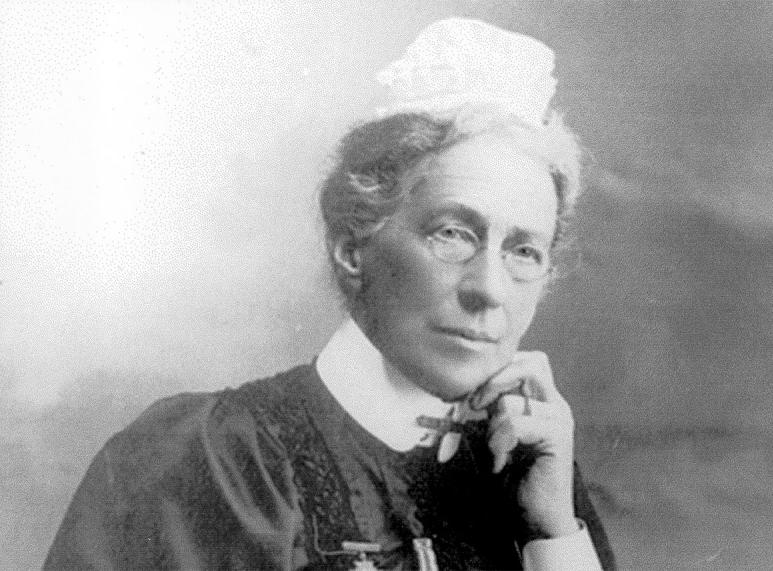
national system of registering trained nurses. In 1901, New Zealand was the first country to have registered nurses with the Nurses Registration Act and in 1902, Ellen Dougherty from Palmerston North became the world’s first state registered nurse.
Since then, nursing in Aotearoa has been on an ever-evolving path. It started as a one-year paid hospital training programme with lectures from medical colleagues covering various areas such as general obstetric/psychiatric/psychopaedic. This evolved into an unpaid, three-year academic degree programme for registered nurses with clinical placements.
The nursing profession has seen the Karitane nurse (baby care) almost disappear, although we still have one treasure, a Karitane Nurse in Neonatal Intensive Care who has been with us for more than 40 years. The many incarnations of the Registered Hospital Aid, Community Nurse, Enrolled Nurse, Nurse Assistant and Enrolled Nurse have come and gone and come again, with their scope about to change and give further value to the work experience, knowledge and skills they have acquired.
Nurses have moved on from being hand maidens to medical professionals and have evolved into highly skilled, knowledgeable, and critical thinkers. Their roles have adapted to incorporate caring for people and their whānau in both hospital and community settings. Through postgraduate studies, nurses can now become leaders, educators, clinical specialists, nurse prescribers and nurse practitioners. It’s a profession that revolves around lifelong learning of new methodologies, technologies, practices, medications, illnesses, diseases, and pandemics.

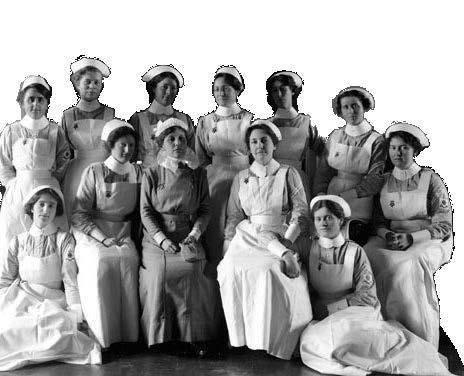
It can be difficult to imagine how we as nurses can improve global health outcomes, but if we look back and work in partnership across the health continuum (sick or well), for one person/ whānau at the right time, in the right place and receiving the right care, we can deliver.


As nurses, history has shown us that good health is in the basics: a clean, warm, safe (inclusive of infection prevention and control principles) and dry environment. Equally important is our willingness to acknowledge, be non-judgemental, to listen, assist, advocate, empathise, enable, educate, and care for those who are mentally, physically, spiritually, and/or emotionally unwell and in a culturally safe and sensitive way. These principles have always been what will provide the way forward locally, nationally, and globally.


“How very little can be done under the spirit of fear. Let us run the race where all may win, rejoicing in their successes – as our own – and mourning their failures, wherever they are – as our own. We are all one nurse”
Florence Nightingale, 1873
Look back and reflect, so you can move forward.Christchurch Hospital nurses 2023 Christchurch Hospital nurses 1913
E mihi ana ahau ki kā tapuhi katoa puta noa i te ao whānui i ā koutou mahi rakatira mō kā tākata te take.
Ko Tākitimu te pae mauka
Ko Ōreti te awa
Ko Te Ara a Kiwa te moana
Ko Tākitimu, ko Uruaokapuaraki kā waka
Ko Kāi Tahu, ko Kāti Māmoe, ko Waitaha kā iwi
Ko Murihiku te marae
Ko Kylie Clark tōhoku ikoa
Tēnā koutou katoa
There wasn’t a particular person or event that inspired Nurse Coordinator Kylie Clark’s career in healthcare. After high school, she moved from Southland to Northland to live with her taua and pōua (grandmother and grandfather) and worked in a nearby retirement home. Her motivation then was to earn money but during her time in the home as an unqualified healthcare assistant, she witnessed some very poor standards of nursing care.
“I was saddened and disgusted by the disregard with which some of these residents were treated, within an institution designed to care for them,” Kylie says.
Almost impulsively, while watching a medical drama on TV, Kylie decided to quit her job and move to Otago to complete her nursing education.
“I was determined to take the lessons that I had learnt about how not to treat people and try to make a positive difference.”
After graduating in 2000, Kylie moved to Auckland and worked for two years in the Coronary Care Unit of Auckland Hospital before a five-year stint in the Emergency Department (ED). Thriving on the intensity, diversity and the endless challenges, Kylie also began to develop her people-management skills as a senior nurse and acting-charge within ED. Ultimately though, she and her partner wanted a better lifestyle, closer to whānau and with less traffic, so moved to North Canterbury.
Acknowledging all the nurses throughout the world and their noble work for the people.
Tākitimu is the mountain range
Ōreti is the river
Foveaux Strait is the passage of water
Tākitimu and Uruaokapuaraki are the canoes
Kāi Tahu, Kāti Māmoe and Waitaha are the tribes
Murihiku is my marae

My name is Kylie Clark
Greetings to you all
After a year in ED here in Christchurch, Kylie then spent almost nine years in what, at that time, she called her personal career pinnacle, the Christchurch Hospital Intensive Care Unit (ICU). During this time, Kylie also undertook shortterm casual relief nursing contracts in Rēkohu/ Wharekauri/Chatham Islands and she started making a concerted effort to learn about her Māori heritage and te reo Māori.
“In 2018 I decided to make the move to a role in after-hours hospital management as an AfterHours Clinical Nurse Coordinator. This role also led to a brief secondment as Duty Nurse Manager before returning to the Coordinator role. These two positions in combination, gave me a good understanding of the day-to-day running of the hospital as well as a new perspective on peoplemanagement on a far larger scale.”
At the beginning of the pandemic, Kylie took on a short-term contract in a Nurse Manager Co-Lead position providing COVID-19 care in the community with a focus on equity for Māori.
“This allowed me greater insights into the broader healthcare system and highlighted some very large gaps that needed addressing, particularly concerning both Māori as end users of our healthcare system, but also of Māori as members of the nursing workforce. That is how I came to be in the position that I am today, as a Nurse Coordinator within the Nursing Workforce Development team
focussing on the Māori nursing workforce and strengthening Te Tiriti o Waitangi and Kawa Whakaruruhau in nursing practice.”

It's no surprise, with her extensive experience and many years in healthcare, that Kylie thinks nurses are integral to the health of the community.
“Nurses form the largest single workforce group within the health system and are often the lynch pin during the healthcare journey for those we serve. You will often find that nurses are propping up and ensuring that the cogs continue to turn at all levels.”
For Kylie, one of the best things about being a nurse is the privilege to be in a position to support and make a difference to patients/consumers and their whānau. This is during a period that (at best) is a low point for them and (at worst) the lowest or most difficult period of their lives. Her other favourite thing about nursing is the people you get to work with and the team camaraderie that comes from shared experiences.
It’s a career not without its challenges though. There’s the unsociable hours, night shifts and general lack of understanding, even from those close to you, about what it is you do.
For Kylie, the biggest challenge in nursing remains staffing shortages because of the pervasive effects these have on healthcare delivery. According to Kylie, as far back as her training days in the late 1990s, there was talk about projected nursing shortages in the future.
“Sadly, this does not appear to have been addressed in a meaningful way and now we find ourselves in a very precarious situation where people are suffering on every side of the equation.” Much has changed in nursing since Kylie began her career more than 20 years ago. Paperwork, checklists and technology dominate the day-today and nurses are expected to do more with less which makes the role busier and more complicated. An ageing population, more complex illnesses, multiple co-morbidities and the pandemic, have all combined to affect the experiences of nurses.
Positively, Kylie says greater diversity in roles, including the growth of senior nursing positions, nurse specialists and nurse practitioners demonstrates the value attributed to these jobs and the people who hold them.
The key to the future of nursing has to be the people, Kylie says.
“Kaimahi (staff) are our greatest resource and for nursing, this means a focus not just on recruitment, but also retention. We owe so much to the amazing internationally qualified nurses (IQNs) who are propping up the health system in Aotearoa right now, but if we are actively recruiting from overseas to fill our current nursing gaps, why are we not seeing targeted approaches and campaigns here at home to recruit and retain New Zealanders, and particularly Māori into nursing?”
Failure in the past to apply cultural safety and the principles of Te Tiriti o Waitangi to nursing practice sees us now in the middle of an unprecedented health reform in an attempt to rectify the massive health inequities for Māori in this country. Kylie is hopeful that this will result in meaningful change.

“I hope that nursing begins to incorporate consistent, structured mandatory education at the national level, around concepts such as equity, institutional racism, biases and Te Tiriti o Waitangi.”
On 22 April the inaugural tapuhi Māori (Māori nurses) hui was held and kindly supported by Pegasus Health.
This initiative was born from calls for greater support for our tapuhi Māori as well as Māorispecific professional development. It was wonderful to see everyone together and hear everyone’s whakaaro (thoughts). The feedback was overwhelmingly positive, and the hope is that this will only be the first of many. Ki te kotahi te kākaho ka whati, ki te kāpuia e kore e whati – when we stand alone we are vulnerable but together we are unbreakable.
Representatives from Recruitment, Allied Health and Nursing attended the Careers Expo at the Christchurch Arena which was held over three days between 10 and 13 May.
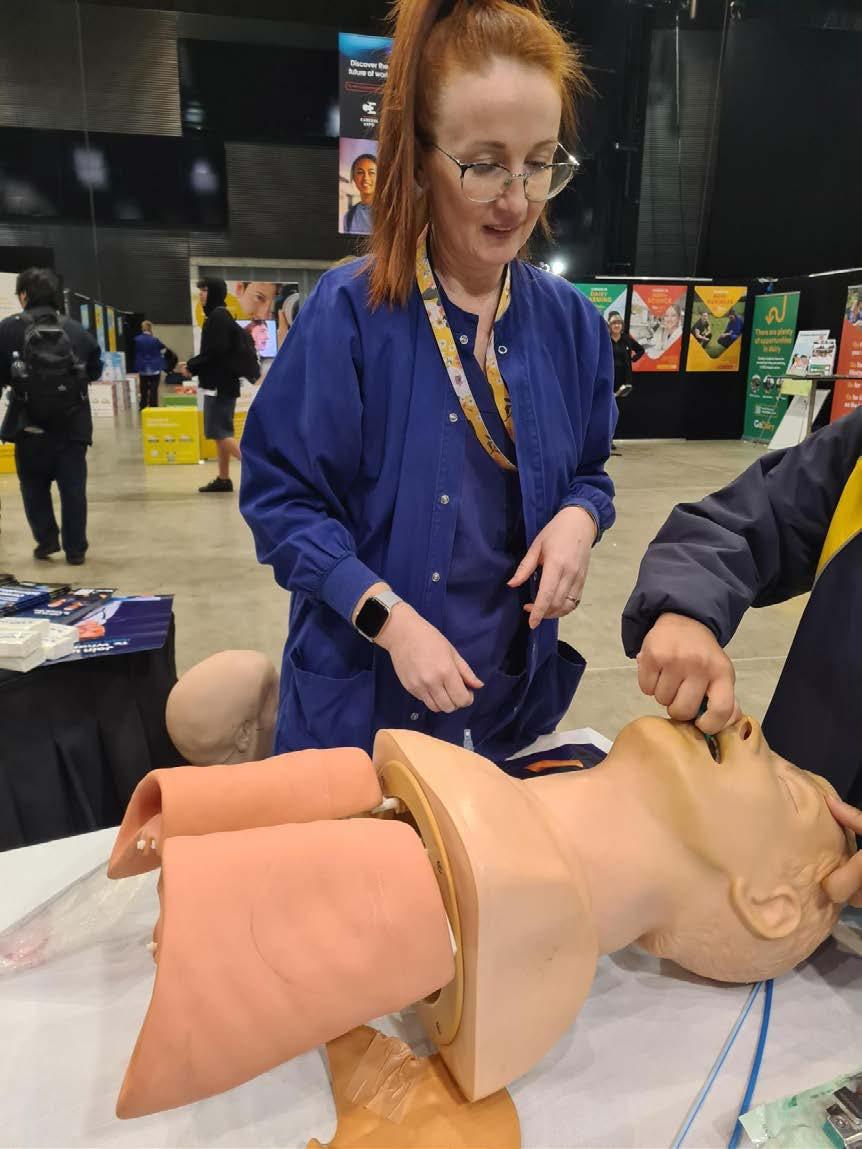

The first two days of the event were set aside for high schools to attend (mostly year 11 and 12 students) with the final day open to the general public.

Some of the clinical experts came along with props that students and visitors could interact with which created a lot of interest.
According to Recruitment Team Lead, Nursing, Midwifery and Allied Health Steph Keene, the students and public were surprised by the variety of roles on offer, including the ‘earn as you learn’ positions such as Trainee Sterile Services Technician.

After an extensive campaign, the much-anticipated 500m2 bike park was finally opened in March under the Waipapa building, providing a safe space for staff to park their bikes and scooters.

Christchurch campus Senior Operations Manager, George Schwass says, "I am delighted that the bike park has finally come to fruition, offering a muchneeded facility for those who choose to cycle or scooter to work."
The inception of the bike park dates back over four years when the new Waipapa Towers were unveiled. The primary objective was to promote staff wellbeing while alleviating the strain on car parking facilities. However, due to various setbacks, including the disruptive effects of COVID-19, the bike park seemed less promising and was deferred due to budget constraints.
Undeterred, the bike users group at the hospital, led by Anaesthetist Richard Seigne launched a campaign to reinstate the bike park.
Richard says, "We submitted a petition to the Board, which prompted a thorough examination of the existing bike/scooter parking facilities by the then Chair, who agreed they were inadequate."
Eventually, the Christchurch City Council also expressed its support for the cause, and nearly two and a half years after the opening of Waipapa, the bike park welcomed its first users. Although funding limitations resulted in the scaling back of planned racks, the bike park remains a secure, weatherproof place with convenient internal access.
Richard adds, "This achievement would not have been possible without the tireless effort of George Schwass, the invaluable support and approvals from the Facilities and Planning Office, and the dedication of Facilities and Engineering Manager Terry Walker, and his Maintenance and Engineering team in facilitating the installations."
He further highlighted the remarkable contribution of the Christchurch Hospital Volunteers, whose generous donation of $50,000 will soon be utilised for additional rack installations.
The bike park is a victory not only for those who campaigned for it but also for the wider community. By encouraging more people to cycle or scoot to work, the bike park promotes wellbeing, and reduces congestion, pollution, and carbon emissions - ultimately everyone benefits, and our city and staff become a little bit healthier.
Additional bike parks are also installed by the new loading docks near to existing mortuary bike parks.

What does your job involve?
This role involves overseeing day to day operations and development of the Te Ha – Waitaha, Smokefree Support service. I lead the delivery of clinical cessation mahi across Waitaha through a ‘hub and spoke’ model where our practitioners are based across a wide range of organisations throughout the district. I specifically enjoy developing learning and training for kaimahi; networking across Te Waipounamu/the Motu, co-ordinating the Te Mana Ora Smokefree Programme Plan with Carmen Cunningham in South Canterbury, and leading research projects that our service is involved in. Currently, a project I am working on has led me to Rēkohu, Wharekauri, Chatham Islands this year where myself and my colleague Christine Solomon (who is from the Chathams and will this year be celebrating 30 years in Public Health) undertook a community and stakeholder research engagement expedition where we promoted smokefree and looked to work on solutions to support an island based approach to addressing smoking prevalence – I feel lucky also to be able to fill my bioethics cup with being a member of our Clinical Ethics Advisory Group (CEAG) for Te Whatu Ora Waitaha.
What pathway got you to this job?
My career started in health doing home-based care focused in supporting medication use and rehabilitation while studying medical anthropology as a focus in my undergraduate, and later in postgrad, Health Sciences (Biomedical Ethics focused) at University of Otago. Upon moving back to Christchurch, I started as a Health Coach with the National Telehealth Service in emergency triage with Healthline, Out of Hours Doctors and later became a Quit Coach with the National Quitline. With moving into Quitline I developed an interest in tobacco control, vaping and addictions. In the last 5 years I have been based in the community in Smokefree, in in-person clinical cessation treatment with Te Hā Waitaha, the regional (now district) Stop Smoking Service. Last year (2023), I graduated with a Master of Health Sciences.
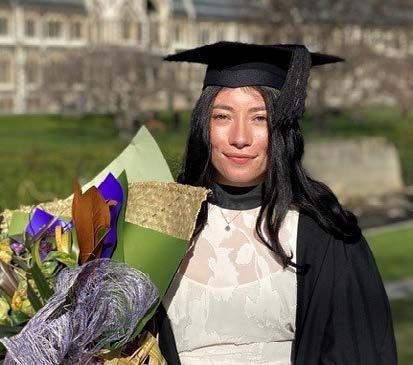
What advice would you give someone keen to enter your field?
If you are passionate, this is a space you will thrive in. Just be prepared to have energy to debate all things vaping, anywhere and anytime.
Who inspires you and why?
My grandmother Maureen whose middle name I share. She is the mother figure in my life who has always understood, validated and inspired me.
What do Waitaha Canterbury’s values (Care and respect for others, Integrity in all we do and Responsibility for outcomes) mean to you in your role?

Simply put, as an ethicist, I enjoy working and living to these values across all areas of my life.
If you could be anywhere in the world right now where would you be?
Dominican Republic or Denmark, visiting family – as well as visiting other genealogical sites relevant to my heritage in Scotland.
Who would you want to play you if there was a movie made about your life?
Either Adelaide Kane – she was extraordinary in Rein (a historical drama about Mary, Queen of Scots), or Chloe Bennet who played Daisy Johnson (Quake) in Marvel Agents of S.H.I.E.L.D.
What are your hobbies/interests outside of work?
I thoroughly enjoy plants, hiking, reading, snowboarding, genetic genealogy, antique markets and a good old day inside binge watching shows like those mentioned above.
If you would like to take part in this column or would like to nominate someone please contact Naomi.Gilling@cdhb.health.nz.





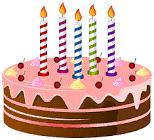
Have you ever heard anyone say that macrons don’t matter, macrons aren’t that important?

I am sure that many of us will have come across this sentiment at one time or another but tēnā rūkahu tēnā! (that is totally incorrect)! Today we are going highlight why the humble tohutō (macron) is so important.
What does the tohutō do?



When you see a tohutō sitting above a vowel, it indicates that we should lengthen that vowel when we pronounce it. You may also see double vowels beside each like “Maaori”, and “kaahu”. These are also pronounced as long vowels, as though there were a single vowel with a macron. This is a common way of writing for those from Waikato-Tainui. Additionally, there are many compound words in te reo Māori where two or more single words have been joined together which may result in two vowels sitting beside each other rather than using a macron. For example, “whakaaro” and “whakaari”.
So, the tohutō influences the pronunciation of the kupu (word) and it also has the power to alter the meaning of the word. In some cases, quite significantly. The following list of words highlights this point.
This last one has particular relevance because for a very long time, the internationally famous special effects and prop company involved in work such as the Lord of the Rings and Avatar, has been known as Weta Workshop. I am sure you can see the issue here. I am happy to report that this misspelling has recently been corrected.
He whakapātaritari – A challenge
Try to notice when there is a macron present necessitating the lengthening of a vowel and carefully pronounce the words as such. I acknowledge that this is sometimes difficult as there are many examples of misspelling such as that of Wētā Workshops throughout Aotearoa New Zealand. This is especially common with our road signs and place names. For assistance, perhaps utilise those around you that may have a bit more knowledge and you can always use Te Aka – Māori Dictionary which gives you a soundbite to listen to and aid in correct pronunciation. www.maoridictionary.co.nz
Ko te reo kia tika, ko te reo kia rere, ko te reo kia Māori – Kia kaha rā!
The language should be correct, the language should be widely heard, and the language should be Māori in ethos – get stuck in and keep going
If you have any questions or feedback, please make contact via the email below. Hauora. Maori@cdhb.health.nz

Dish: Soup (not vegetarian)
Ingredients:
› 1½ cups green split peas
› 2 tbsp olive oil
› 2 carrots peeled and chopped
› 2 celery sticks chopped
› 1 onion chopped
› 3 cloves garlic crushed
› 700g ham or bacon hock
› 8 cups of cold water

› Salt and freshly ground black pepper
Method:
Rinse the split peas under cold water until the water runs clear. Drain.
Heat oil in a large saucepan over medium heat. Add the carrot, celery, onion and garlic and cook, stirring for five minutes or until the onion softens.
Add the split peas, ham/bacon hock and water. Bring to the boil over high heat then reduce to medium and simmer, cover for 2 – 2½ hours, or until the hock is tender and the meat is falling away from the bone. Set aside for 5 minutes to cool slightly.

Remove the hock from the pan and take the meat off the bone. Coarsely chop the meat and set aside.
Puree the pea mixture until smooth. Return to the pan with the meat. Season to taste with the salt and pepper. Stir over a medium-high heat until hot. Serve with warm crusty bread.
This yummy and hearty soup will keep for up to five days in a sealed container in the fridge. It can also be frozen.
I was transferred to the CCU under the leadership of Charge Nurse Manager Rose Avis and her nursing team. I found the care and professionalism of the nursing team extraordinary and I cannot speak highly enough of the care I received both physically and emotionally from the nursing staff. I have run and owned a business and dealt with staff in a commercial environment for over 35 years and I feel I can recognise when a group of people are well led, dedicated, highly-skilled and supportive of each other, and this is what I experienced on this ward. It is obviously a stressful and busy environment for the nursing staff, but I always felt the staff had time for me and were interested in my care. So, there was a sense of personal care from them rather than them just doing a job. I also witnessed the staff dealing with patients that were frightened, confused or angry and at all times the nursing staff were professional, treated patients with dignity but could still create an atmosphere of being happy as a team and supportive of each other. There were a number of staff that I specifically had interaction with and I would like to bring these nurses to your attention:
Rose Avis, Denise Cumberpatch, Sophie Fairbairn, Maree Nicholson, Karren Wilder, Nicole Friend, Kristina Vali and Stephanie Grbic. I just wanted you to know that you have some very good people at the hospital and this patient is very grateful and thankful for their commitment and dedication.


I could not have asked for better care. At all stages I was kept informed of what was happening and was, without exception (nurses, doctors, administrators, orderlies, technicians) treated with kindness and courtesy. All this in an extremely busy environment. Everyone was knowledgeable and professional, and I always felt treated as an individual rather than as just another patient. I am extremely grateful for the prompt and sensitive treatment I received.
I was in the hospital with a broken wrist and want to thank the whole Emergency Orthopaedics team for looking after me so well. I really felt respected and taken care of, and they were all really fun while providing a very professional service. I ended up having an operation on my wrist, and the Acute Surgical Admissions team and everyone doing my operation was great as well. Special shout out to the Anaesthetic team - they were great to chat to. The new building feels so much better too, even the CT scan room had a great view of the Botanical Gardens. Thank you all for making my time on hospital so easy and (almost) fun.
I can only offer sincere thanks and praise for the prompt, efficient, informative health care and treatments I received. All staff encounters were kind, professional, appreciated and helpful.
Please pass on my best regards to all staff in the departments I passed through. I can't thank them enough.
I was admitted to Christchurch Hospital via ambulance on 26 April after having a heart attack at my work. The ambulance crew that came to my office were outstanding. Their total focus was on me. They hooked me up and were talking to the cardio lab within minutes of arriving. I was quickly transported to ED where I was met by a large team who were again focussed solely on me and all knew their role. I was immediately moved into theatre but along the way Dr Ian Crozier explained to me what was happening. From there I was in the hands of Dr David Smythe and his team. I had a large blockage that required removal, but this could not be done by suction and as my arteries were abnormally large nor could a stent be used. I was administered medication to bust the block. Somewhere along the process I went into cardiac arrest and was resuscitated. After the procedure I was moved to Ward 12 for recovery. From there it’s a bit of a blank. I was later told I suffered three further cardiac arrests and each time was resuscitated by the nursing staff on duty. The next 48 hours were spent stabilising my heart and getting my new meds sorted. Again, much of this was a blur. But one thing was very clear; the professionalism, dedication and care of their patient by the nursing staff. I was told later that nurse Joy was the person who brought me back from near death three times. Joy looked after me for three days along with Nicole, Denise, and Stephanie supported by others over the four nights I was in ward 12. These nurses all have a common focus on the patient and the whole team has a great feel and culture. This in my experience doesn’t just happen. They are led by Rose who runs a tight ship and makes sure everyone knows their role and is supported by her.
You can be very proud of all staff who attended to me. Everyone who I met showed real professionalism and concern and care for my wellbeing. You have got something very special in the Cardiology Department. I would not be here today typing you this letter without them all doing
their part. I’m not sure how I can ever repay all these people, but the first thing is to say thank you to everyone.
Ward B8 and Wellfood
I work as a registered nurse for Te Whatu Ora Waitaha and being on the other side as a patient was a crazy experience. I had elective surgery in private and ended up with multiple complications, culminating in a ride in an ambulance and being brought to Christchurch Hospital.

I was admitted very late to B8 into the Neuro Progressive Care Unit (NPCU), where I then stayed for the next week.
The nursing staff there were amazing throughout my entire stay, treating me with kindness, expertise and knowledge. I felt in very safe hands, especially through all the shifts where their staffing was tight, I felt incredibly supported and cared for.
Thanks also to the Intensive Care Unit outreach team, who delicately placed an IV line in my very bruised arms, with tricky veins and the charge nurse, who ensured I had privacy because looking after staff is always difficult.
A special shout out to Lorraine from Wellfood, who went out of her way to help me. I had been on clear fluid only for almost a week and have some dietary requirements so when I was eventually allowed to eat, it was tricky. Lorraine went out of her way to ensure I had everything that I needed.
Ward 10
Such wonderful, friendly staff up in Ward 10. Keep up the great work.
Ward B4, Orthopaedics
Anna in Ward B4 was very sweet, helpful and great company.
Ward A5
A lovely fresh and spacious hospital environment and most importantly, staff are warm, helpful and efficient.
We would like to say how wonderful Jayden the hand therapist has been. Professional, knowledgeable and fun with a good sense of humour.
Thank you for your wonderful care of our father [patient name] over a couple of weeks recently. We are so grateful for the time you spent with him, both before and during the time he had COVID-19, and for him being able to leave hospital safely. You do an amazing job!
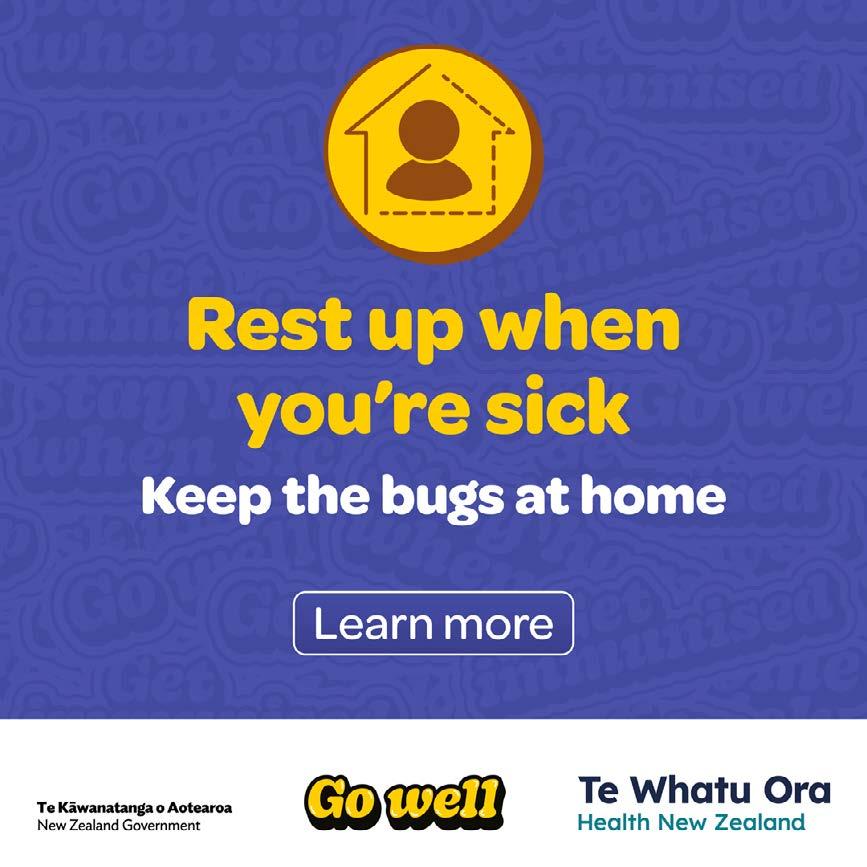
My almost 93-year-old mother recently had an outpatient appointment for an endoscopy.

I would like to compliment all of the staff she saw that day. They were incredible! Kind, caring, gentle, informative, and of good humour and the whole experience, apart from the few minutes of discomfort for the procedure itself, was made as pleasant as it could possibly be.

I especially would like to thank Alison Ross who conducted the procedure. Apart from being a wonderful human being, Alison commented to me, that she noted my mother's thyroid levels were high/thyroxine medication was high; this led to me following up with mum's GP to have her thyroxine reduced. The outcome of this being that the increased confusion/memory loss that my mother had been recently experiencing, and which was leading to the likelihood of her needing to transfer into rest home level care, has now reduced. I am extremely grateful that Alison made this comment to me to allow me to follow up. It has made a huge difference.
Please pass my thanks and good wishes to Alison and her team.
In recent years, there has been a growing awareness of the harmful effects of smoking and vaping, not just for people who partake in these activities, but also for those exposed to secondhand smoke or vape.

“World Smokefree May is great opportunity to highlight that as a healthcare facility we have a responsibility to promote a healthy environment for our patients, staff and visitors”, says Secondary Care Smokefree Coordinator Sue Stevenson.
“One of the key aspects of enforcing a smokefree/ vapefree policy in a hospital is the effective use of signage.”
Smokefree and vapefree signs play a critical role in communicating the policy to everyone who enters the hospital grounds, serving as a visual reminder that smoking and vaping are prohibited on hospital premises. All staff play a crucial role in enforcing this policy, she says.
Sue acknowledges that quitting smoking or vaping can be difficult.
Te Hā - Waitaha / Smokefree Support delivers a free, cessation programme for anyone who wants support to become smokefree. Nicotine Replacement Therapy is also available in most wards/areas to help those who want to manage their tobacco withdrawals or make a quit attempt.
“While promoting a healthier environment for our patients and staff, Waitaha Canterbury’s Smokefree, Vapefree and Smokeless Tobacco Policy also sets a positive example for our community. We hope that our policy, which has recently been updated, will encourage others to adopt similar policies and promote a healthier future for everyone.”
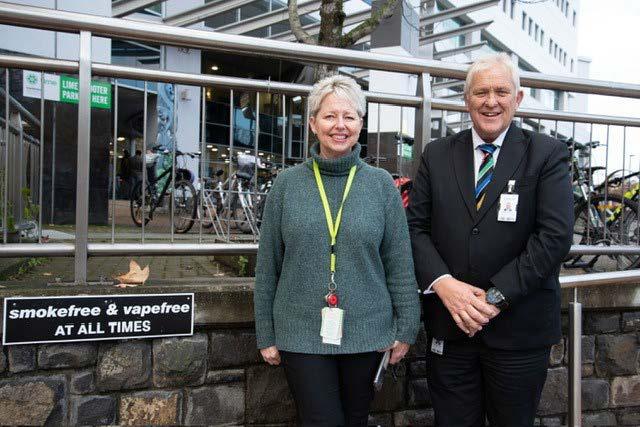

New café operators are up and running in the University of Otago, Christchurch, staff and student café – now under its new name, Central Park Café, in the main Rolleston campus building.

New operators Hannah and Ryan (owners of nearby Tuam Street Kitchen), along with University management, would like to invite all Te Whatu Ora Waitaha staff to enjoy the new café.
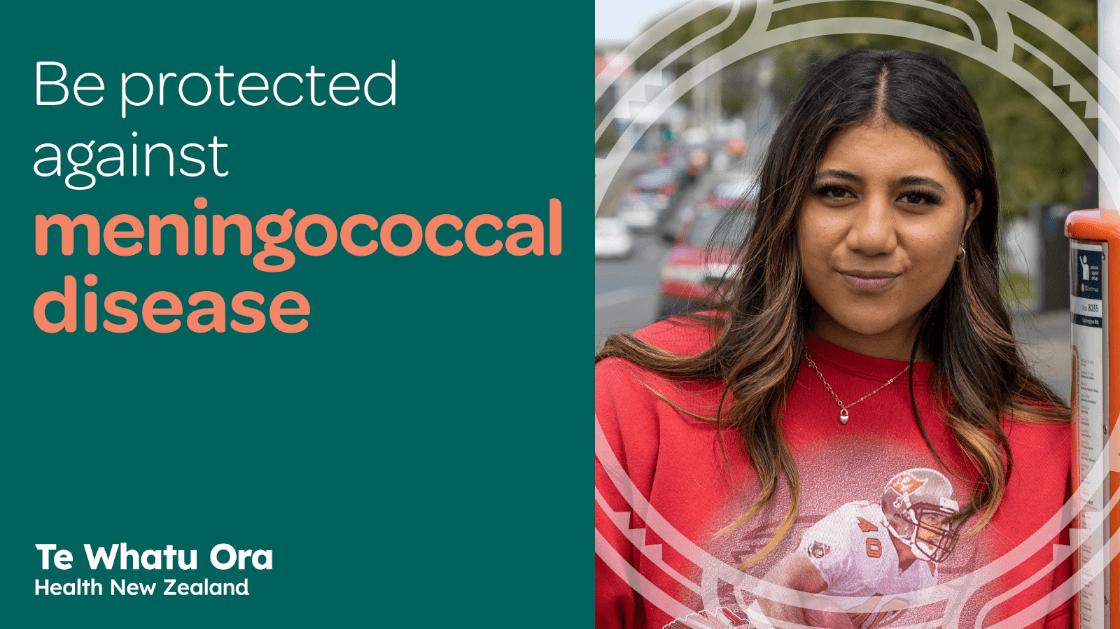
There are two ways staff can gain access to the campus building. Simply pop along to the main University of Canterbury campus reception desk (on the ground floor) or email reception.uoc@ otago.ac.nz and the reception team can add the necessary swipe access to your current Te Whatu Ora ID card. You’ll just need your 6-digit staff ID number (top right-hand side of your ID card) and your 4-digit code.
Open from 7.30-4.00, Central Park’s barista-trained staff are proudly serving Coffee Supreme coffee, a wide variety of tasty house-made offerings – hot soups, freshly made pasta meals, hot pies and other warming fare, alongside rolls, wraps, subs, scones, muffins, cold drinks and sweet treats etc. All diets are catered for.
Central Park can also provide catering for breakfasts, lunches, morning and afternoon teas, as well as canapes for your next event. Check out their catering menus at www.centralparkcafe.co.nz
Pop in, relax, enjoy top notch coffee and food, with plenty of seating – overlooking our beautiful Hagley Park.
Something for You is the Te Whatu Ora - Waitaha Canterbury employee benefits programme. The deals offered are from the New Zealand business community to say thank you for all that you do. Please see below offers for you.
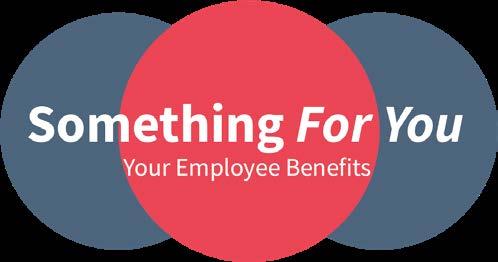
Riccarton Shoe Clinic - Riccarton Mall, 129 Riccarton Road

20 percent off all items in store (which are not already reduced) for Te Whatu Ora - Waitaha employees and their immediate family membersshow your staff ID to redeem.
The Front Runner Colombo - Shop 4a, The Colombo. 363 Colombo St. Sydenham, Christchurch

10 percent off full priced and sale priced items in store and online - show your staff ID in store to redeem or use the discount code found here in the online store.

Global Living - 100 Moorhouse Ave, Christchurch Central

15 percent off all purchases - show your staff ID to redeem.
Gelato and Tea - 96 Oxford Terrace, Riverside Market, Christchurch Central
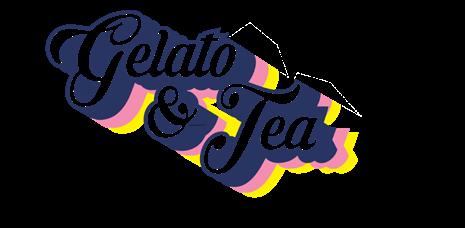
Get 20 percent off your food order - show your staff ID to redeem.
1. b. 1896
2. a. USA (4), France (2), Australia (2), United Kingdom (3)
3. d. Princess Anne and her daughter Zara Tindall (UK) both competed as equestrians. Princess Anne in 1976 and Zara in 2012.
4. a. True. The arts were events between 1912 and 1948.
5. c. Lisa Carrington (Canoe/kayak). Lisa has won six medals – five gold and one bronze.
6. a. Beijing. The Chinese capital hosted the Summer Olympics in 2008 and the Winter Olympics in 2022.
7. b. In protest of the New Zealand All Blacks touring South Africa that same year (due to the apartheid policies in place in South Africa at that time)
8. c. Eric the eel. (Moussambani, who had never seen an Olympic-sized swimming pool before, swam his heat of the 100 m freestyle in the slowest time in Olympic history (1:52.72). He ended up winning his heat after both his competitors were disqualified due to false starts.
9. b. 28. He has 23 gold, three silver and two bronze.
10. d. It was the first time that every participating nation had at least one female athlete competing

The Health Quality & Safety Commission’s He Hoa Tiaki | Partners in Care team is hosting a one-day forum at Te Pae, Christchurch convention centre.
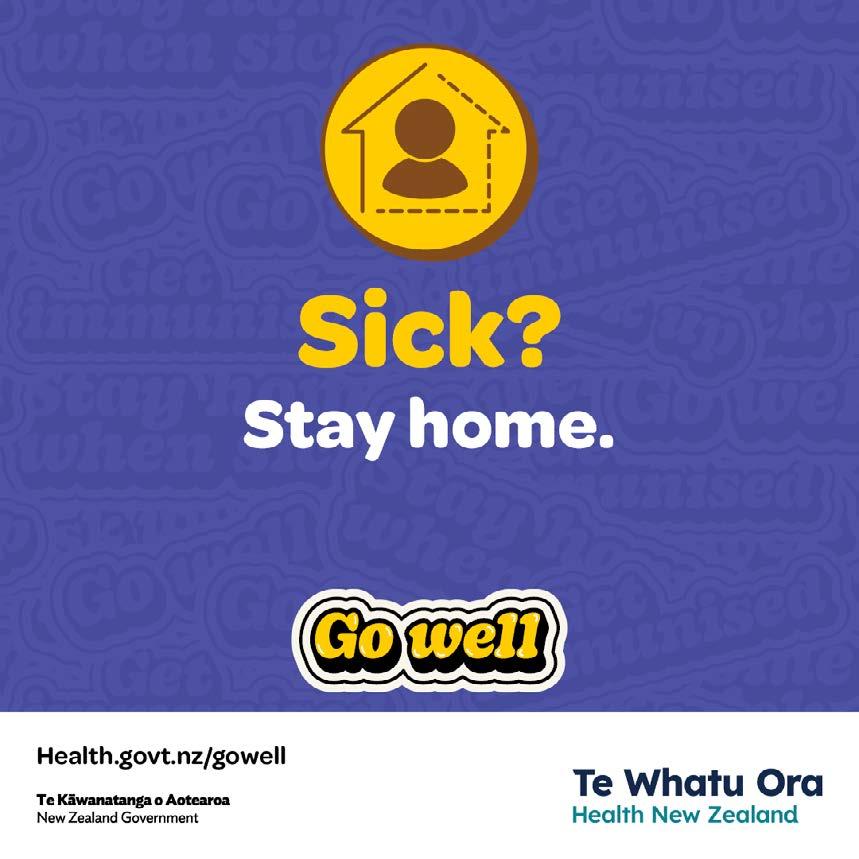
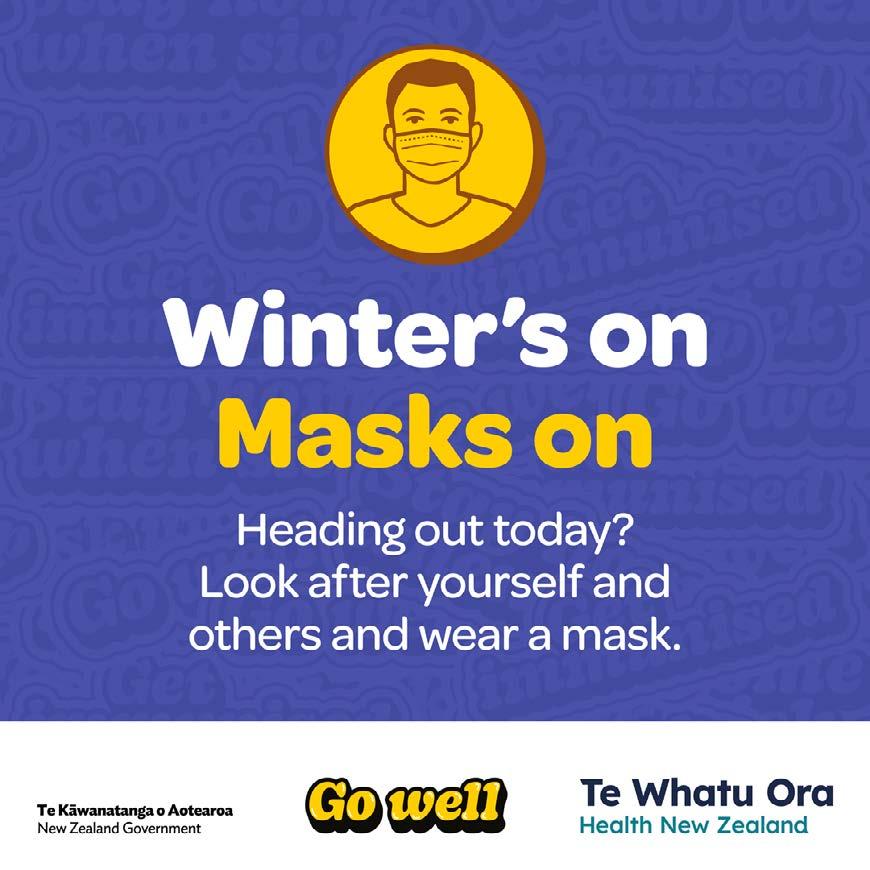
It will focus on te huarahi ki pae ora | the journey to healthy futures.

Date: 25 May 2023
Time: 9.30am to 4.30pm
Location: Te Pae, Christchurch Convention Centre
The event will run from 9.30am - 4.30pm. A networking function will follow this from 4.30 - 6.30pm.
To read the full programme or register visit: www.hqsc.govt.nz/OurVoices
29 May – 4 June

Being immunised is one of the best things we can do to protect ourselves, our whānau, and our communities. Prioritise to immunise this week. www.immunise.health.nz
